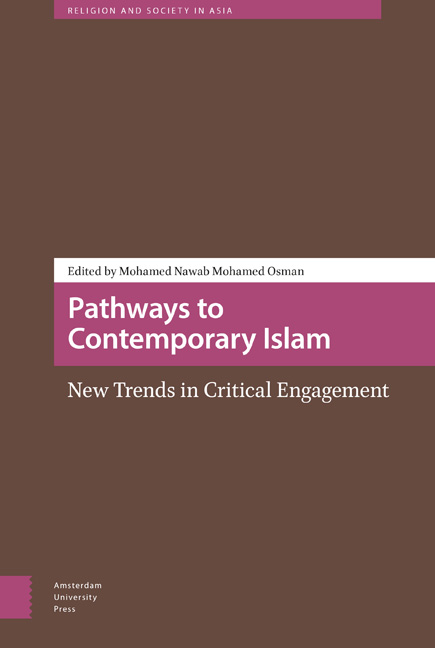Book contents
- Frontmatter
- Dedication
- Contents
- Acknowledgements
- Introduction: Constructing Pathways to Contemporary Islam
- Section 1 Historical Trends in Contemporary Perspective
- Section 2 Contesting the Islamic Intellectual Tradition
- Section 3 Beyond the Arab Revolutions: Political Islam Revised
- Section 4 Contemporary Spaces of Critical Engagement
- Notes on the Contributors
- Index
6 - Building Trust in the Democratic Process: The Role of Islamists in Tunisia’s Post-Arab Spring Transitional Politics
Published online by Cambridge University Press: 25 November 2020
- Frontmatter
- Dedication
- Contents
- Acknowledgements
- Introduction: Constructing Pathways to Contemporary Islam
- Section 1 Historical Trends in Contemporary Perspective
- Section 2 Contesting the Islamic Intellectual Tradition
- Section 3 Beyond the Arab Revolutions: Political Islam Revised
- Section 4 Contemporary Spaces of Critical Engagement
- Notes on the Contributors
- Index
Summary
Abstract
Post-Arab Spring events indicate that democratic openings can result in power shifts from secular authoritarian regimes to mainstream Islamists, contributing to a heightened secular-religious political polarization. This chapter considers how Tunisia's Islamists avoided this pitfall where other post-Arab Spring countries failed. It argues that one key factor that helped Tunisia's democratic transition was the building of a minimum level of trust during pre-Arab Spring interactions between non-regime secularists and Islamists, rooted in the common understanding that democracy in Tunisia was desired by all political participants. The Islamists’ willingness to trust in the democratic process and to engage in consensus building with secular political partners helped mediate the many contentious conflicts that arose at critical junctures of Tunisia's democratic transition.
Keywords: Secular-religious political polarization; democratization processes; post-Arab Spring politics; Ennahda
Introduction
The popular revolution in Tunisia, which brought down President Zine el Abidine Ben Ali and his authoritarian regime in January 2011, had a cascading effect in the Middle East and North Africa (MENA) region. Ben Ali's quick flight from Tunisia sparked hopes of political change in the minds of Arabs. The potential to shift power from long-standing repressive and corrupt governments to the hands of the people was no longer a vain fancy; instead, it became a reality in the making. From the civilian-led major uprisings in Egypt, Libya, Syria, and Yemen, to the street demonstrations in Bahrain, Saudi Arabia, Jordan, Algeria, and Morocco, the Arab Spring appeared to signal a region poised for a gradual transition to democracy.
Amidst these upheavals and power shifts, new democratic openings enabled the Islamists to emerge as major political actors after decades of being marginalized or even violently suppressed. Islamist-oriented political parties won majorities in parliamentary seats in free and fair elections held in Tunisia, Egypt, and Morocco. Despite deep misgivings about the hidden agendas of Islamists held by certain segments of Arab secularists and the Western world, there was a sense of ‘cautious optimism’ about the development of a unique democracy articulated and led by mainstream Islamists.
However, eight years forward, this optimism has faded away with much of the MENA region now either deeply mired in bloody conflict with Sunni- Shia sectarian overtones or have returned to the pre-Arab Spring status quo with prevailing authoritarian power structures intact.
- Type
- Chapter
- Information
- Pathways to Contemporary IslamNew Trends in Critical Engagement, pp. 145 - 166Publisher: Amsterdam University PressPrint publication year: 2020



